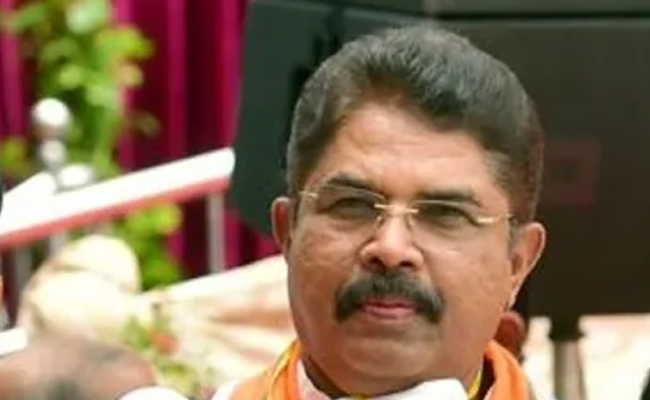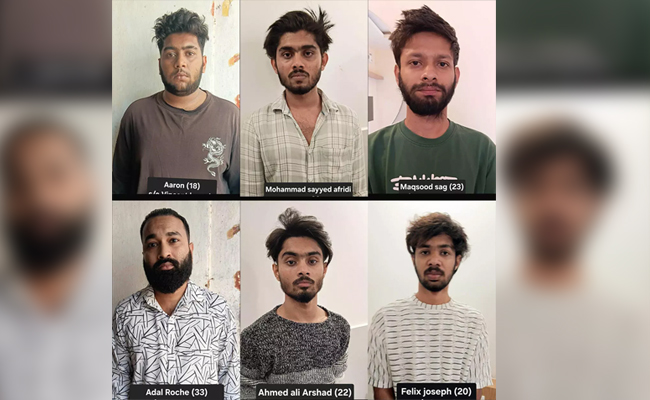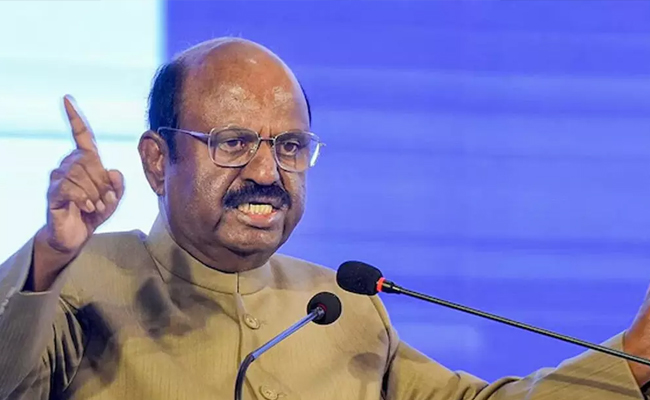Beijing, April 14: In the wake of a raging US-China trade war, India on Sunday offered to export soybean and other agriculture products to Beijing, which has slapped retaliatory tariffs on American products.
India also slammed the US for its "protectionist" trade policies, saying the "unseemly" practice has hurt the world's economic recovery.
At the 5th India-China Strategic Economic Dialogue in Beijing, Niti Aayog Vice Chairman Rajeev Kumar said that Beijing and New Delhi were unruffled by the "protectionist noises" and could well be the important anchor for the world economy.
"We have noticed that you import a lot of agricultural products probably to the tune of $20 billion or more," Kumar said.
"And I was noticing that there were some tariffs that were issued on farmers from Iowa and Ohio etc. Maybe India can substitute for something like soybeans and sugar if we could have access to those exports with all the due quality considerations for that you might have on our farmers. That might be very useful," Kumar said referring to the US-China trade war.
China and the US -- the world's two largest economies -- are locked in an ugly trade spat with both sides hitting back at each other by imposing slapping economic tariffs.
In the first week of April, the US announced tariffs worth $50 billion on Chinese products which, it said, was the result of Beijing forcing the American companies to transfer their technology to China's firms.
Beijing was quick to fire back by imposing taxes on 106 US products.
The wrangling has worried the world, which is witnessing a sluggish economic growth.
In March, US President Donald Trump had threatened India with retaliatory tariffs if New Delhi did not lower taxes on American products.
"There is for the first time a cyclical and synchronized recovery in the world economy happening after a very long time. But this is actually marred and disrupted by some unseemly protectionist noises that are coming out of the Atlantic basin, North America, and Europe," Kumar said in an oblique reference to China.
"But thankfully the emerging economies of Asia have seemed to ignore these protectionist noises and have continued to grow at a very high rate of speed with China growing at 6.8 and India growing 7-7.2 per cent," Kumar added.
The dialogue was attended by the delegation of China's National Development Reforms Commission.
Kumar said that India and China need to work for a better economic climate for our investors and entrepreneurs.
"We both have to do ease of doing business so that our procedures, red tape, and non-tariff barriers get sorted out so that investors from both the countries in their respective fields get the investment opportunities."
"We have liberalized as you know all the business visa regimes for the Chinese investors to come. We now give them multiple three-month visas. If you could make this possible for our investors, it will really help in taking this investment forward from Indian investors who are very keen to come to China."
"Dangal has been a great success in China and if that is so we would like to expose the Chinese population to some more Indian movies. So if there can be liberalization of entertainment and if you can expand working groups from current five to two more: one on culture which includes entertainment; the other one could be one on pharmaceuticals because we import a lot of your pharmaceuticals APIs."
"The time has come for those APIs to be used in some formulation that could be re-exported to China with all the FDA regulations of China and our highest quality."
Let the Truth be known. If you read VB and like VB, please be a VB Supporter and Help us deliver the Truth to one and all.
Bengaluru (PTI): Leader of Opposition in the Karnataka Assembly R Ashoka on Thursday took a dig at CM Siddaramaiah ahead of the state Budget presentation, claiming that the government is expected to borrow Rs 1.15 lakh crore and is likely to impose fresh taxes on the people.
He said the Budget would have nothing new, adding that its highlights would be criticism of Prime Minister Narendra Modi and repeated mentions of the five guarantee schemes ('Shakti', 'Gruha Lakshmi', 'Gruha Jyoti, 'Yuva Nidhi' and 'Anna Bhagya').
Chief Minister Siddaramaiah, who also holds the Finance portfolio, is scheduled to present the 2026–27 Budget on March 6. This will be his record 17th budget.
“Siddaramaiah-led Congress government’s budget will be presented tomorrow. While Finance Minister Nirmala Sitharaman reduced the tax burden in the Union Budget, Siddaramaiah is known for imposing taxes on people. He imposes about four taxes a month and has already introduced 36 taxes, and is now looking for ways to impose more,” Ashoka said.
Speaking to reporters, he said the Congress had promised people before coming to power that the guarantee schemes would be implemented without imposing any burden on them.
“By the end of the chief minister’s term, the state’s total debt will probably exceed Rs 6 lakh crore. The government has already breached financial discipline. Siddaramaiah and his government are somehow managing the situation,” Ashoka claimed, adding that his borrowings as CM equal those of 12 or 13 former chief ministers combined.
Stating that the Budget should create higher revenue sources, ensure that no burden is placed on people, and take the state away from debt, the opposition leader said this could be ensured only by a “clever and intelligent finance minister.”
“Anyone can run a government by pushing the state into debt,” he said, accusing Siddaramaiah of “increasing the state’s debt and failing to meet the expectations of the people.”
Highlighting that Siddaramaiah blames the previous BJP government for everything, Ashoka said Basavaraj Bommai, the chief minister during the previous BJP government, had presented a “surplus budget,” without excessive borrowings.
“Despite having the opportunity to borrow more while staying within the parameters of financial discipline, he (Bommai) did not do so, as it would burden the people,” he said, accusing Siddaramaiah of borrowing crores of rupees every year.
“I feel that this time too, he will take a loan of Rs 1.15 lakh crore,” he claimed.
The BJP leader said he had written to the CM requesting an allocation of Rs 15,000 crore annually for the development of backward taluks, as recommended by the High Power Committee on Redressal of Regional Imbalance (HPCRRI), chaired by economist Prof M Govinda Rao.
Claiming that the government appears “inactive” due to internal rifts, Ashoka pointed to an ongoing power struggle between factions led by Siddaramaiah and Deputy Chief Minister D K Shivakumar over the CM’s post.
“Amid all this, we cannot expect anything new from this Budget. The CM will repeatedly speak about the guarantee schemes and target the central government and PM Modi. Criticising Modi and repeated mentions of the five guarantee schemes will be the highlight of this Budget. Other than that, there will be nothing new,” he added.
He also dismissed the CM's claim that the government had achieved 90 per cent of the promises made in the previous Budget. “The fact is that not even 9 per cent has been achieved. I have evidence for it,” he said.
Ashoka further alleged that the government had also failed in tax collection, achieving only 48 per cent of the target, and had released less than 40 per cent of the allocated funds to some departments.




